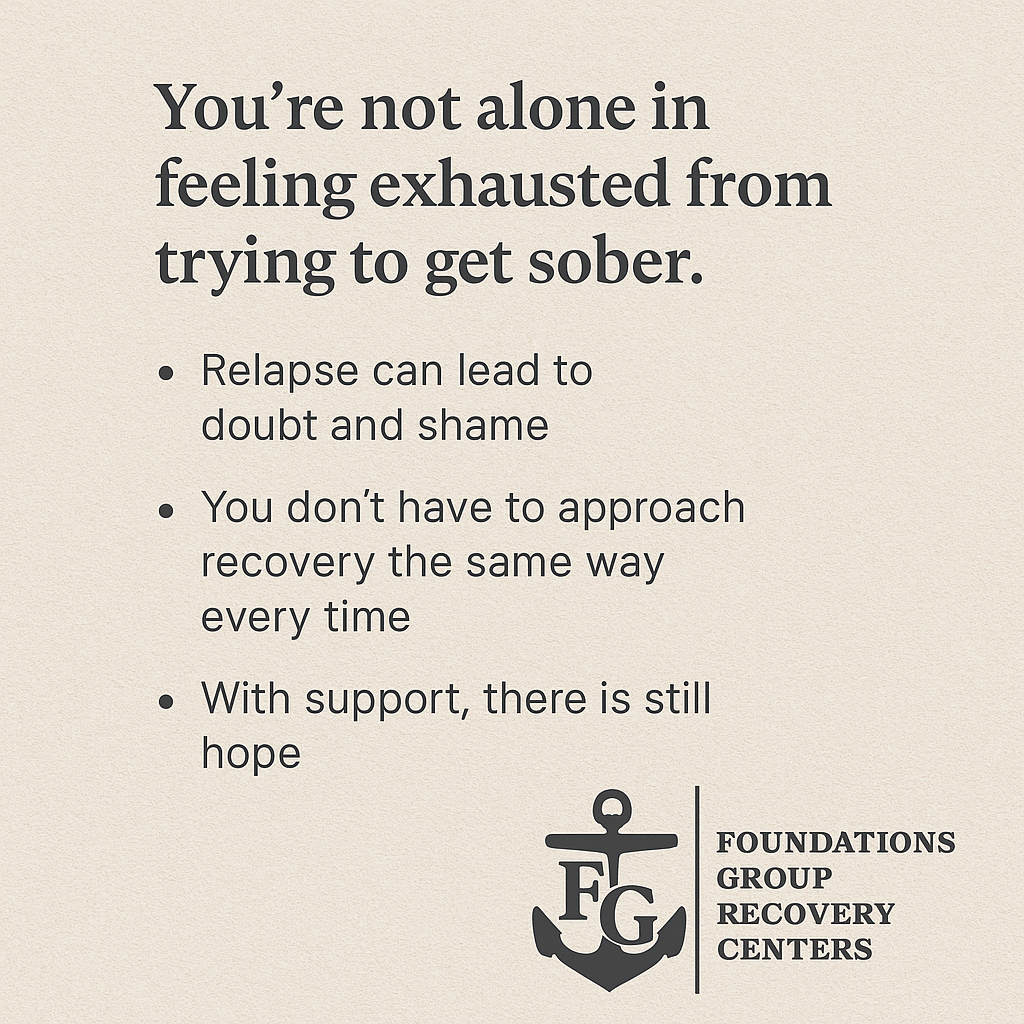I remember sitting on the edge of my bed, head in my hands, thinking, “I can’t do this again.” I’d been sober. I’d made it past 90 days. And then I relapsed. The weight of that crash—it wasn’t just about drinking again. It was about losing the version of me I’d finally started to like. I wasn’t just tired. I was soul-tired.
If that’s you right now, I want you to hear this: you’re not weak for feeling tired. You’re human. And maybe it’s not that you failed—but that the way you were doing recovery just wasn’t working for you anymore.
1. Exhaustion Doesn’t Mean You’re Broken
After my relapse, the thing that surprised me most wasn’t how disappointed I felt—it was how tired I was. Like every part of me wanted to disappear for a while. I thought maybe that meant I was too far gone. But a therapist at Foundations Group Recovery Center said something I still hold onto:
“Being tired means you’ve been trying. It doesn’t mean you’re done.”
That was the first thing that softened the shame. I started to see my exhaustion as a signal, not a sentence. I needed rest, not punishment. I needed care, not criticism. Most of all, I needed to believe that being tired didn’t mean I was beyond help.
2. Relapse Isn’t the End—It’s a Message
I used to think relapse meant I was back at square one. But when I looked closer, I realized it was more like a flashing light: something in my recovery plan wasn’t holding me the way I needed. Maybe I was white-knuckling. Maybe I wasn’t really connected. Maybe I still didn’t feel safe being seen.
The shame after relapse can make it hard to be honest. But when I finally sat down with someone who asked, “What wasn’t working for you?”—instead of, “Why did you mess up?”—I felt something shift. I started to see my relapse as information. Not an excuse. Not a failure. A message.
It was saying: You’re still hurting. You still need help. And maybe that help needs to look different this time.
3. You Don’t Have to Do Recovery the Same Way Every Time
One of the biggest shifts for me was letting go of the idea that there was only one “right” way to get sober. I’d done inpatient. I’d done 12-step. I’d tried being the “perfect patient.”
But the thing that helped me after relapse was outpatient alcohol addiction treatment in Massachusetts that actually fit my life.
Foundations didn’t treat me like I was starting from zero. They met me with respect. They asked what I wanted to work on. They helped me figure out what was still hurting—not just what I’d done wrong.
That changed the game. I stopped feeling like I had to perform recovery. I started to live it, one honest day at a time.
4. Support Can Look Different the Second (or Fifth) Time Around
The kind of support that helped me early on wasn’t the kind I needed after relapse. I didn’t want cheerleaders. I needed people who could sit in the mud with me and not flinch. The group therapy at Foundations had that energy. Honest. Real. No one pretending it was all going to be easy.
And that gave me the room to be honest, too. I started telling the truth about the parts of me that still hurt. About the fears I carried. About the parts of sobriety that felt hollow or scary.
That’s when things started to shift. Because when I stopped pretending, the healing got real.
5. Real Hope Is Quiet but Steady
When I first started drinking again, hope disappeared. It felt like I’d ruined my shot. But what I’ve learned since then is this: real hope isn’t loud. It’s not some motivational speech. It’s a whisper that says, “You can try again.”
That whisper got louder the more I let go of shame. The more I showed up, imperfect but still willing. And that’s how recovery stuck—not because I was perfect, but because I kept choosing to show up differently.
Some days, hope sounded like getting out of bed. Some days, it sounded like calling my therapist instead of drinking. And some days, it was just knowing that someone would be there if I did fall.
You Haven’t Missed Your Chance
If you’re reading this and thinking, “That’s where I am,” I want you to know: you haven’t missed your window. There are alcohol addiction treatment options in Massachusetts that actually meet you where you are—including ones that understand relapse and recovery aren’t one-size-fits-all.
I’ve been there. I’ve felt like I used up all my chances. But the truth is, there’s always another step you can take—especially if you take it with people who understand what it’s like to fall and get back up.
Frequently Asked Questions About Alcohol Addiction Treatment in Massachusetts
Is outpatient treatment enough if I’ve relapsed before?
Yes, for many people, outpatient treatment can be incredibly effective—especially if the program offers personalized care and trauma-informed support. Foundations Group Recovery Center provides flexible options that support real life, not just a clinical checklist.
What if I can’t commit to a full-time program right now?
There are part-time options available. Foundations offers intensive outpatient and evening programs so you can balance work, family, and recovery without sacrificing any of them.
Do I have to start over if I’ve relapsed?
No. You’re not starting from scratch—you’re starting from experience. Good treatment centers recognize your past efforts and work with you to build on them, not erase them.
How quickly can I start treatment?
Foundations can often schedule an intake within 24–48 hours. You can call today to ask about availability and next steps.
What makes Foundations different?
They don’t shame. They don’t push. They listen. And they tailor the treatment to who you are and what you actually need. It’s about real healing, not just checking boxes.
Ready to talk it through? Call Foundations Group Recovery Center at (844) 763-4966.
Whether it’s your first time or your fifth, we’re here to help you find your way back.


